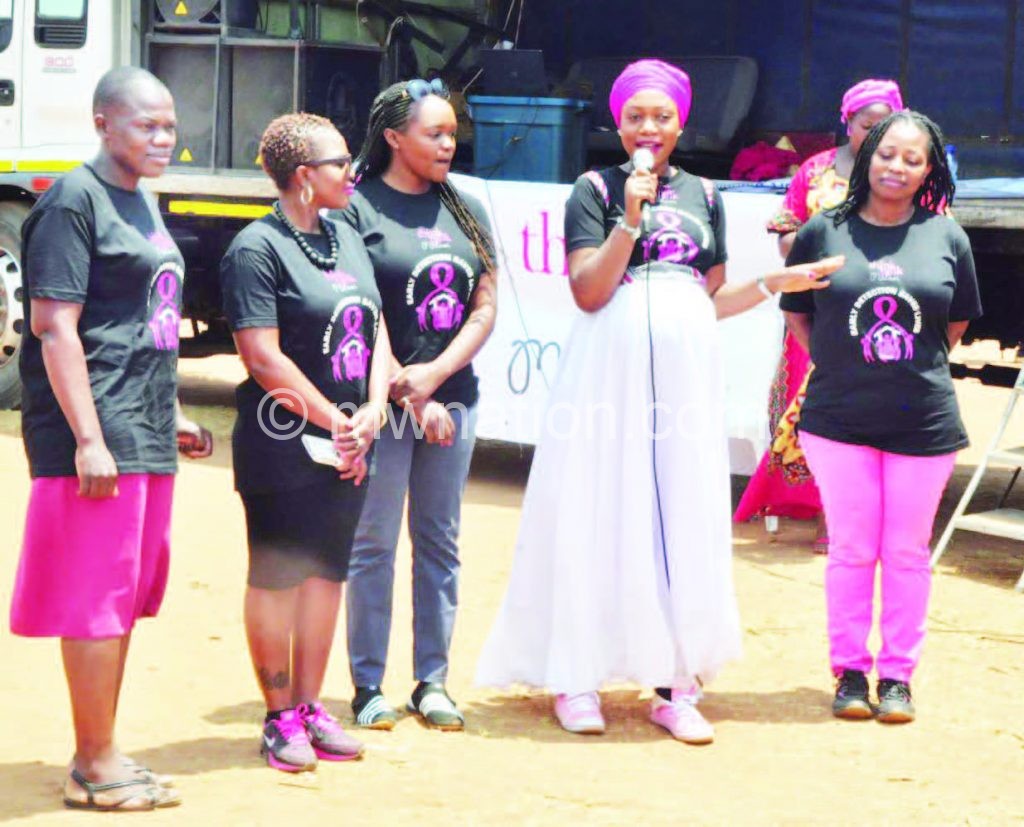Aiding breast cancer fight
Many breast cancer patients in Malawi suffer in silence, seek treatment unrelated to the disease and die from the curable tumours, MCDONALD CHAPALAPATA writes:
Somewhere in Malawi, a woman is lying in agony from a curable disease likely to kill her. She may not know that she has breast cancer.

According to the World Health Organisation (WHO), the world’s most common cancer in women is among the top three cancers that torment women—the first being cervical cancer.
If that woman dies, she will add to over 450 000 women that succumb to breast cancer every year globally.
October was Breast Cancer Awareness Month, highlighting how women can survive this disease.
Blandina Khondowe, founder of Think Pink initiative, survived breast cancer in 2013.
She was aged 32 when she was diagnosed with the disease and underwent a surgery to remove a tumour and lymph nodes in her breast.
After the healing of the wounds, she had to undergo six cycles of chemotherapy, one in every 21 days.
She also underwent hormonal therapy for five years. This entailed taking a tamoxifen pill every day to avert the resurfacing of breast cancer.
At times, Khondowe could not help but cry as she went through the treatment cycle.
“My family and friends were by my side the whole time, listening to my cries, laughing and praying with me. I cherish my friends more than ever and I have learnt to be a good friend,” she told The Nation in an interview.
Khondowe does not want any woman to go through the pain she endured.
Together with her like-minded friends, she founded the Think Pink Malawi in October 2014 to ramp up breast cancer awareness countrywide.
The initiative also promotes cervical cancer awareness as part of holistic care for women.
WHO ranks early detection of the disease “the cornerstone of breast cancer control”.
“If detected late, however, curative treatment is often a longer option,” the UN health agency reports.
It is the longer, painful route Think Pink wants to avert.
The charity wants the high prevalence of breast cancer cases in Malawi to be tackled decisively to save women’s lives.
It is concerned that women keep falling ill and dying without knowing the cause.
Others know their condition too late to survive.
Besides, the breast cancer treatment is dogged with myths, misconception, late presentation for medical assistance and inadequate screening.
Since its inception, Think Pink has facilitated the screening of 1 500 women for cervical and breast cancer through outreach activities in both urban and rural areas.
The charity has referred about 200 of these clients to hospitals for further medical assistance.
During the Breast Cancer Awareness Month, National Bank of Malawi (NBM) plc donated K2.5 million towards the cancer screening and treatment initiative championed by Think Pink Malawi.
This support is enough to help 62 women know their status.
Apart from physical examination by a health worker, the screening involves ultrasound scans to figure out if there are any abnormalities in the breasts.
When the health worker squeezing the breast feels unusual ramps, the woman is referred for an ultrasound scan and biopsy, where tissue from a breast tumour is taken for laboratory testing.
The waiting queues for such diagnostic procedures in public facilities and financial hardship resulting from long trips to health facilities and hospital stay force many women to discontinue the process.
The bank’s support will assist women to access the tests privately or to get some transport refund if necessary.
Experts say an ultrasound scan of one breast currently costs K40 000 while a mammogram is at K68 000.
NBM stepped in because many malawian women, where half of the population is living in poverty, cannot afford this process.
Akossa Hiwa, the bank’s marketing and corporate affairs manager, says breast cancer awareness is critical for early detection and treatment.
“This money will be paid directly to the medical facility. We hope that it will facilitate patients’ access to good care,” she says.
Hiwa says NBM will work with Think Pink Malawi to raise awareness among its customers and staff.
The information-sharing initiative will focus on risk factors, self-screening and how to access care.
NBM staff raised funds to pay for treatment courses by buying pink ribbons.
The bank further observed Pink Fridays—interested workers wore some pink each Friday in solidarity with the cause.
Think Pink co-founder Eleanor Nkosi says National Bank’s involvement in their campaign gives them an incredible mileage to reach needy women.
“It will help us spread our message to an audience nationwide. We are grateful to be joined by the bank on such an important campaign that affects all Malawians,” she says.
Reaching out to one community at a time, the breast cancer activists hope to create a Malawi where discussing one’s health and such diseases as cancer is no longer taboo and shameful to those suffering in silence. “We believe that the health and well-being of one person is the health of their community. We are determined to champion this cause for those who have no voice,” says Nkosi.




